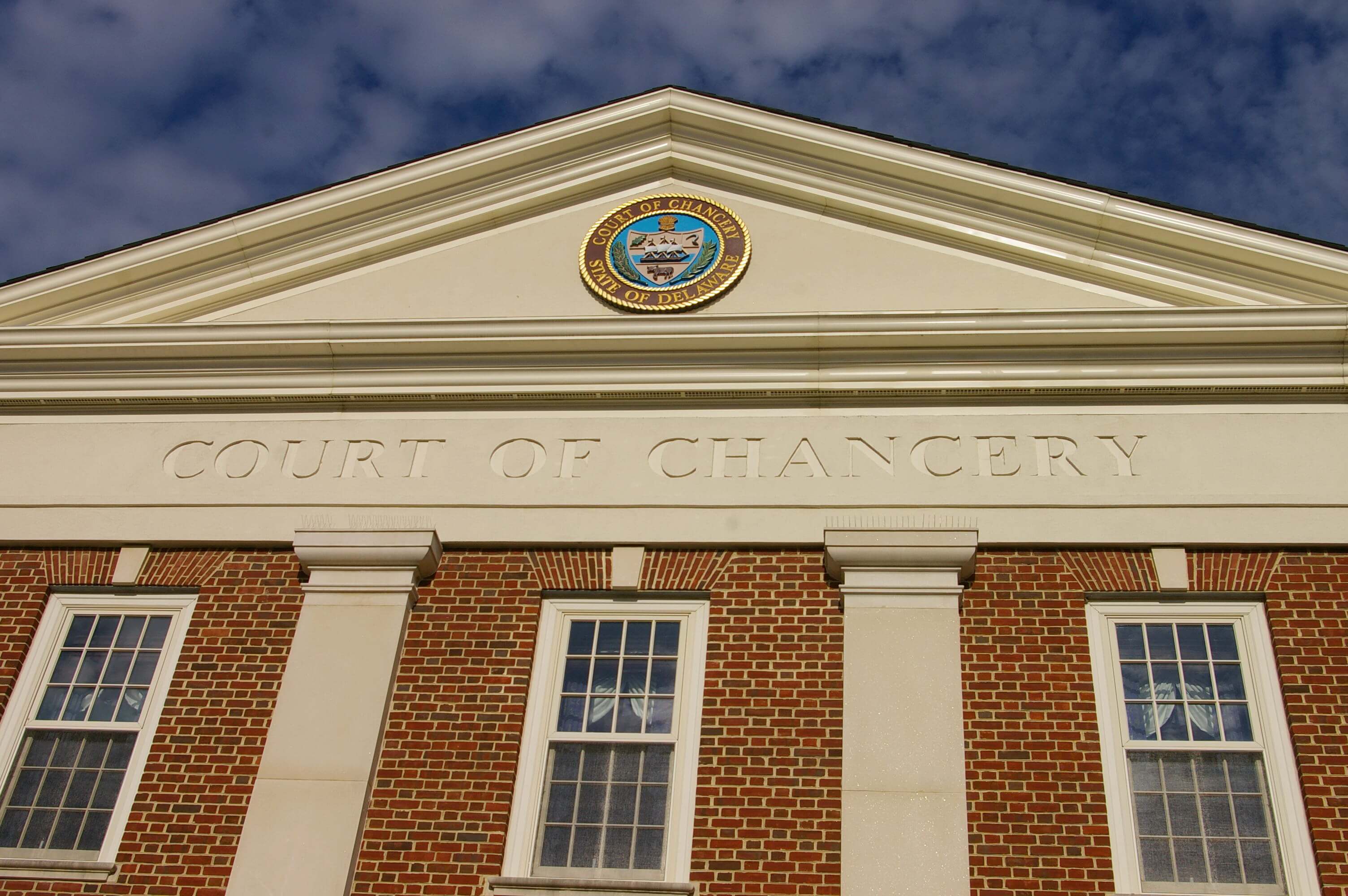
The Court of Chancery of the State of Delaware is most commonly recognized as the nation’s leading forum for the determination of commercial disputes, but in addition to being the choice forum for Delaware corporate law matters, the Court of Chancery has jurisdiction over trust and estate litigation disputes. In Delaware, a petition challenging a last will and testament, a petition to remove an executor of a will, the filing of exceptions to an accounting, and other disputes concerning the administration of an estate are brought before and decided by the Court of Chancery. The establishment of the Delaware Court of Chancery, a non-jury court of equity, dates back to 1792, and today, it stands as one of the few existing separate courts of equity in common law jurisdictions.
Delaware’s Court of Chancery inherited its equity jurisdiction from the English court of equity; and in its organization and proceedings, particularly in the form of pleading, practice and evidence, it has adhered more closely to the English Court of Chancery and to English precedents than those of any of her sister States.[1] The origins of the Court of Chancery date back to England during the times of the feudal system when separate courts existed to hear matters of law and matters of equity. The English courts of law included the Court of King’s Bench (or Queen’s Bench), the Court of Common Pleas, and the Court of Exchequer. The High Court of Chancery was the sole English court of equity. The judicial officer of the court of equity, known as the “Chancellor”, was traditionally the keeper of the King’s conscience, a high ranking official who operated in equity and good conscience.[2] If an aggrieved party did not have an adequate remedy available in the court of law, he could apply for relief from the Chancellor.
Chancellors were typically clerics and influenced by cannon law.[3] A person who had acted unreasonably or unconscionably would not be provided relief from the Chancellor who followed the classic equitable maxims, including the notion that one could not come to the court with “unclean hands” and obtain an equitable remedy. The main difference between a court of law and a court of equity was the type of remedy available to the aggrieved party. The common law courts were concerned typically with awarding judgments for money and not with ordering anyone to do anything.[4] The courts of equity developed so that a party who had been wronged but did not have an adequate remedy at law could seek relief, and thus, the Chancellor could right the wrong by fashioning an equitable remedy to do complete justice.[5]
Equitable remedies are considered extraordinary remedies; they are not considered the norm. Where money damages, a legal remedy, will suffice to provide adequate relief, equitable remedies are unavailable to the aggrieved party. However, upon a showing that there exists no adequate remedy at law, a party may be awarded an equitable remedy, such an injunction, constructive trust, specific performance, or an accounting.
Delaware’s Court of Chancery was first created under the Colonial Act of 1726-1736, in which “the Judges of the then Courts of Common Pleas in each of the counties were authorized to hold Courts of Chancery under the same system of equity as was administered in the High Court of Great Britain.”[6] The existence of the Court of Chancery was at the mercy of the General Assembly under the Colonial Act and again under the Constitution of 1776; legislative action was sufficient to do away with the court’s being. It was the Constitution of 1792 that firmly established the Court of Chancery as one of the three constitutional courts of Delaware in Article IV, Section 14:
The equity jurisdiction heretofore exercised by the Judges of the Court of Common Pleas, shall be separated from the common law jurisdiction, and vested in a Chancellor, who shall hold Courts of Chancery in the several counties of this State.
Del. Const. Art. IV, § 14. Thus, the Constitution of 1792 created the Court of Chancery as a constitutional court with constitutionally defined jurisdiction.
It is well settled that Delaware’s Court of Chancery was created “with all the general equity jurisdiction of the High Court of Chancery of Great Britain as it existed prior to the separation of the American colonies with the exception that the Chancellor shall not hear and determine any cause where a sufficient remedy exists at law.”[7] Additional powers may be conferred upon the Court of Chancery by the General Assembly. Consistent with its historical origins, rather than “judges”, the judicial officers of the Court of Chancery are the Chancellor and Vice Chancellors. Originally, the court consisted of only one Chancellor, but the office of Vice Chancellor was created subsequently in 1939 to share the duties and responsibilities of the job with the Chancellor. Today’s Court of Chancery consists of one Chancellor and four Vice Chancellors who are nominated by the Governor and confirmed by the Senate for a term of twelve (12) years. In addition to the Chancellor and Vice Chancellors, there are two Masters of the Court of Chancery. Masters, who are selected by the Chancellor, may make factual findings, conclusions of law, and recommend how to dispose of a matter, however, their rulings are not final until reviewed and adopted by the Chancellor or a Vice Chancellor.
Today, the Court of Chancery has jurisdiction to hear and decide cases arising under Title 12 of the Delaware Code, known as the “Delaware Probate Code.” Although its authority over trust and estate disputes is considered “well established,”[8] Delaware had an Orphan’s Court up until 1970 that enjoyed jurisdiction over the administration of estates. In 1802, the Chancellor became a member of the court, and from 1802 until 1831, the Chancellor was the only judge of the Orphan’s Court. The composition of the Orphan’s Court changed several times until the court was abolished in 1970, when all of its authority was transferred to the Court of the Chancery, with the exception that its jurisdiction over adoptions and terminations of parental rights ultimately came to rest with the Delaware Family Court.
The roots for the Chancery Court’s jurisdiction over the administration of estates again derived from England. Chancellors in the High Court of Chancery had authority to oversee the administration of estates and decree distributions to the heirs after payment of estate debts and expenses since the end of the reign of King Charles II.[9] Oversight over the administration of estates, wills and trusts, was well within the realm of equitable jurisdiction considering the fiduciary obligations owed by the personal representative of the estate to the estate heirs, distributees, and legatees.[10] “The most common example of equitable rights in [the Court of Chancery] are fiduciary rights and duties that arise in the context of trusts, corporations, other forms of business organizations, guardianships, and the administration of estates.”[11] In furtherance of the court’s authority over the administration of estates, the Register of Wills is a clerk of the Court of Chancery.[12]
If you are a beneficiary of an estate and have concerns that the personal representative of the estate is not fulfilling his/her obligations to you and the estate, you should consult with an attorney experienced in handling estate petitions before the Court of Chancery. If the administrator or executor has misappropriated estate funds, failed to timely file the estate inventory or accounting, or mishandled estate debts or assets, the Court of Chancery may use its equitable remedies to fashion the proper relief for the estate and its beneficiaries.
[1] Glanding v. Industrial Trust Co., 45 A.2d 553, 555 (Del. Ch. 1945).
[2] MURRAY ON CONTRACTS, § 127, (4th ed. 2001).
[3] Id.
[4] Id.
[5] Id.
[6] DuPont v. DuPont, 32 Del Ch. 413, 420 (Del. Ch. 1951).
[7] Id.
[8] See Cummings v. Estate of Lewis, 2013 WL 979417, *4 (Del. Ch. Mar. 14, 2013).
[9] Glanding, 45 A.2d at 555 (citing 1 Storey, 10th ed. (Redfields), 543).
[10] In re Estate of Farren, 131 A.3d 817, 831 (Del. Ch. 2016).
[11] Christiana Town Ctr, LLC v. New Castle Center, 2003 WL 21314499, *3 (Del. Ch. Jun. 6, 2003); see also Del. Tr. Co. v. Blackstone, 81 A.2d 126, 133 (Del. Ch. 1951) (““[T]he instruction of executors and other fiduciaries is a jurisdictional field within which the Court of Chancery has historically operated. The instruction of executors in connection with the administration of estates is an extension of equitable jurisdiction originally exercised over trust and fiduciary relationships and, as such, is a party of the exclusive jurisdiction of the Court of Chancery.”).
[12] 12 Del. C. § 2501 (“In performing the functions of the office the Register of Wills of each county shall act only as a Clerk of the Court of Chancery.”).

Tiffany M. Shrenk is an associate attorney in the firm’s Delaware office. She is licensed to practice law in Delaware and Pennsylvania. Tiffany represents clients in a wide range of civil litigation matters including, but not limited to, personal injury, trust and estate litigation, real estate litigation, as well as contractual disputes and consumer fraud. Tiffany can be reached at 302-654-4454.

